





In many ways Asia is all that Europe is not. In other words, it provides the perfect opportunity for the University of St.Gallen’s International Executive MBA students to learn about new ways of doing business, innovating, and creating value. The Asian city we choose for our course is Beijing, the capital of Asia’s largest and the world’s second largest economy. The pedagogical approach of our faculty leader, Tomas Casas Klett, is integrative thinking. That means that by gaining a deeper understanding of Beijing and China—its culture, history, governance, business models, strategies, foreign investors, and the rapid advances in artificial intelligence (AI)—we are able to connect the dots of how the world works and gain valuable insights on what Asia has to offer us. One of frameworks employed to absorb and structure new knowledge, as well as the opportunities and risks of various countries and geographies discussed—which also included Japan, Korea, SE Asia and India—is the Elite Quality Index which measures the sustainable value creation of nations and their respective elite system.
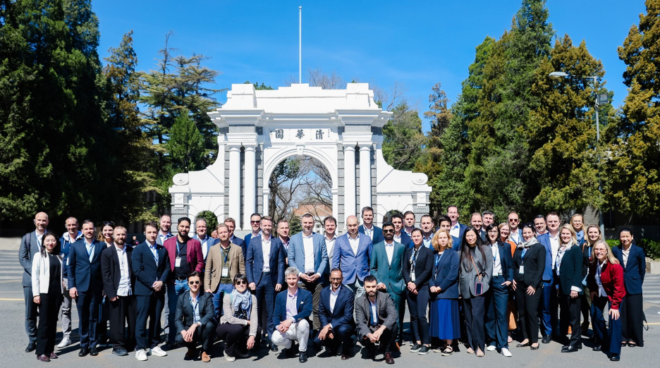
Our local academic partner is Tsinghua University’s School of Economics and Management (SEM). In the above image we stand in front of the original Tsinghua Gate, built in Western neoclassical style to symbolize China’s aspiration to modernize through education. Tsinghua University was founded in 1911 with funds from the Boxer Rebellion Indemnity that were returned by the US and is now one of the highest ranked in the world and Asia’s best.
During our time on in Beijing, we had opportunity to learn from distinguished professors and explore renowned Chinese companies.
Professor Huang Zhangkai clarified that China’s success is a story of decentralisation and explained how the case of Tesla illustrates how Chinese policymakers behave like VCs. In 2018, Elon Musk struck a deal with the Shanghai government where land and other incentives were provided against the expectation of future taxes. Next, Professor Rai Di discussed China’s political economy and the intricacies of the relationship between government and business, providing our cohort with a deeper understanding of how dynamics function that went far beyond what research alone can offer.
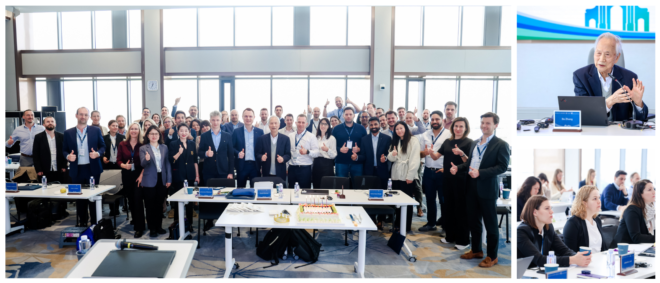
The third lecture was one that most of us will never forget. Professor Bo Zhang, the “Father of Chinese AI”, shared with us a trajectory that started in 1978 with Chinese contributions to Quotient Space Theory of Problem Solving and Neural Networks. He went on to review current AI applications from expert systems to mobile robots. There were many takeaways for our group, but perhaps the most important was that DeepSeek is far from being an isolated case, and China is poised to be a fountain of innovation. Professor Bo Zhang himself seems to be drinking from the fountain of youth: As he delivered his energetic lecture, we found out that it was his 90th birthday (which we celebrated with the birthday cake seen in the picture above).
The integrative thinking approach connected the academic learning with sessions and deep discussions with Chinese executives and business leaders to understand how they operate, how they grow, their strategies and their ambitions for the future. Few IEMBA participants had previously heard about the BOE Technology Group (BOE), one of those massive unknown champions of China whose products we have all used: They supply more than a third of the world’s smartphone and laptop screens and their IP is now second to none.
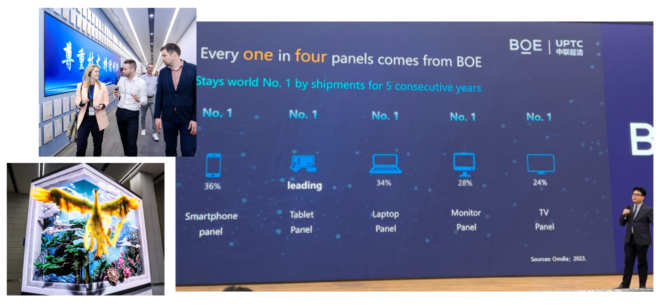
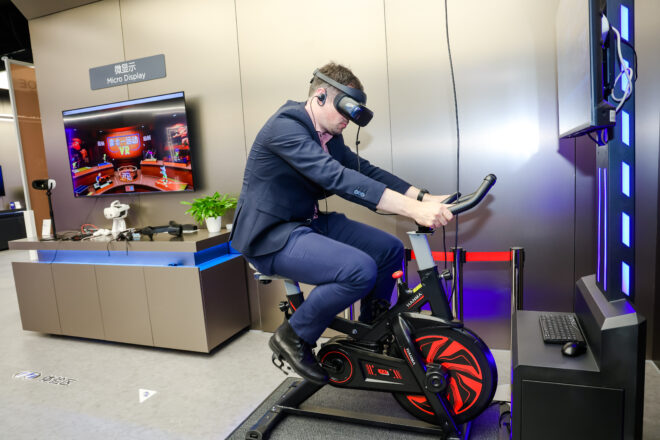 But BOE is not satisfied with producing the best LCDs, OLEDs, flexible displays, MicroLEDs, fingerprint sensors, optoelectronic sensors and solar panels where it already enjoys market dominance. Doubling down on innovation, it is now getting ready to scale and upgrade new technologies like virtual reality screens as Patrick Sumi is finding out on this test bike.
But BOE is not satisfied with producing the best LCDs, OLEDs, flexible displays, MicroLEDs, fingerprint sensors, optoelectronic sensors and solar panels where it already enjoys market dominance. Doubling down on innovation, it is now getting ready to scale and upgrade new technologies like virtual reality screens as Patrick Sumi is finding out on this test bike.
Tencent is China’s most valuable company. We visited their Beijing headquarters and learned about their cloud, how they help companies with their digital transformations, and their positions in the AI ecosystem.
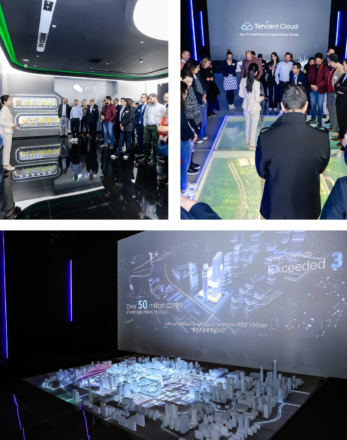 Connecting the dots back to Professor Bo Zhang’s lecture it was an eye-opening experience to really get a sense of the ultra-competitive AI landscape in China where a multitude of firms are competing for leadership across domains ranging from foundational models to robotics. Many of us work in a European contexts and we felt as if China is leaving us far behind and raised many questions on how we could catch up with and learn from our Chinese competitors and partners in areas like AI and EVs.
Connecting the dots back to Professor Bo Zhang’s lecture it was an eye-opening experience to really get a sense of the ultra-competitive AI landscape in China where a multitude of firms are competing for leadership across domains ranging from foundational models to robotics. Many of us work in a European contexts and we felt as if China is leaving us far behind and raised many questions on how we could catch up with and learn from our Chinese competitors and partners in areas like AI and EVs.
China’s deep cultural roots offer essential perspective – and for our students, engaging with these traditions greatly enriches the learning experience.

Food is one way of sharing and learning, and our networking dinner with Tsinghua alumni was a highlight of the trip. The dinner took place at Gui Temple, a significant historical structure at the northern end of Beijing’s central axis—the “Tail of the Dragon”—
with a long history that spans the Yuan, Ming, and Qing Dynasties, Republic of China, and modern periods. During the Cultural Revolution it was repurposed as a factory and now invites diners to enjoy modern Beijing cuisine in a unique atmosphere.
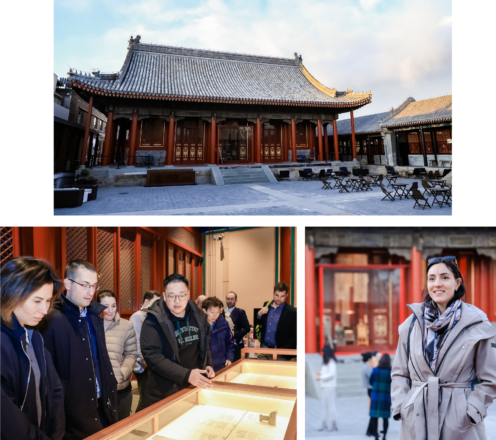
Friendships were formed during the dinner as in China, networking is as much about heartfelt connection as it is about business. Yet, there were rich opportunities for learning. For instance, we discovered that China produces 80% of global caviar and that the country is a leader in fish reproductive physiology, fish nutrition, water quality and systems engineering, filtration systems, oxygenation, and recirculating aquaculture systems. The owner of one of China’s largest producers was asked by our IEMBAs—probably half-jokingly—if they could sample her products. Ms. Tian, pictured below, obliged. Providing evidence of China’s efficiency in all parts of the value chain, she arranged a spontaneous late-night delivery from her Beijing distributor.
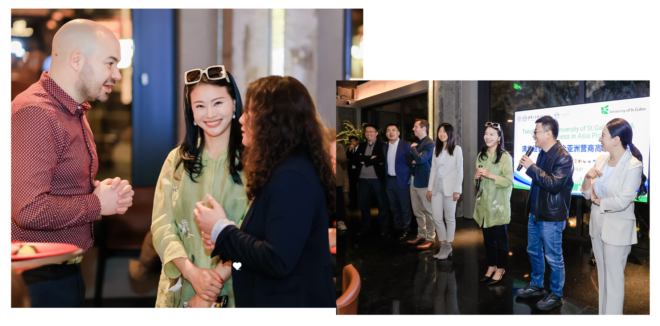
The course also took care to bring in the Swiss perspective. After all, the China Competence Center (CCC-IIDM) at the University of St.Gallen carries out research on the Sino-Swiss Free Trade Agreement (FTA) and provides the academic leadership for the annual Swiss Business in China Report, initiatives that are both of great value to the Swiss business community in China. During a lively panel discussion Lars Eckerlein, the General Manager of the Swiss electrification and automation firm, ABB Group, explained how the firm benefits from China’s transition to net zero. Next, Beat Strebel, the CEO Reinsurance China & Country President at Swiss Re, discussed the characteristics of the reinsurance market and emphasised its ultra-competitive nature. Roger Germann, Head Business Development and External Affairs, offered a perspective from a high-tech SME, as he manages the adoption of Geistlich’s regenerative medical devices in the China market. Zhen Xiao, the CEO of Swiss Center China, then shared his wide experience in helping hundreds of Swiss companies to enter the Chinese market. All highlighted the strategic importance that China has for European firms both as a market and a source of knowledge.
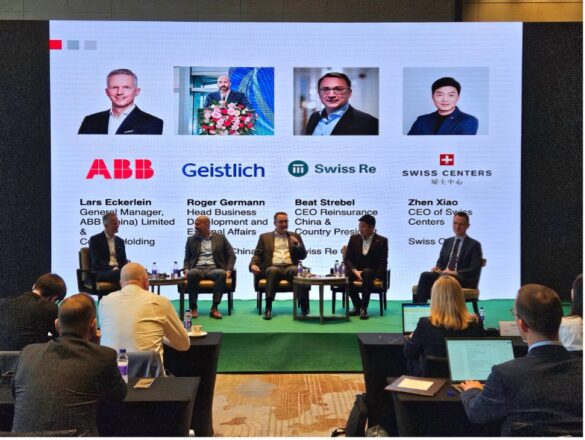
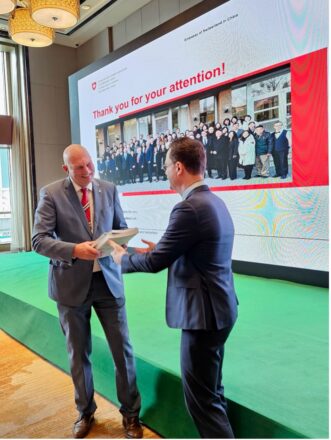 To wrap things up, our deepest thanks go to Jürg Burri, Ambassador of Switzerland to the People’s Republic of China, Mongolia and DPRK who led a full session on the final day and is seen here receiving the University of St.Gallen’s China research report and the latest version of the Elite Quality Index (EQx). It became evident to all students how fortunate the Swiss are to benefit from such an active, approachable, and analytically minded public servant. Ambassador Burri exemplifies the ethos of a type of diplomacy that is grounded in meaningful connections and strategic insights.
To wrap things up, our deepest thanks go to Jürg Burri, Ambassador of Switzerland to the People’s Republic of China, Mongolia and DPRK who led a full session on the final day and is seen here receiving the University of St.Gallen’s China research report and the latest version of the Elite Quality Index (EQx). It became evident to all students how fortunate the Swiss are to benefit from such an active, approachable, and analytically minded public servant. Ambassador Burri exemplifies the ethos of a type of diplomacy that is grounded in meaningful connections and strategic insights.
As we connected the dots one conclusion stood out: At a time when the world risks drifting toward de-globalisation, the Swiss model of international business and free trade is a win-win pathway to sustained prosperity and growth for all.
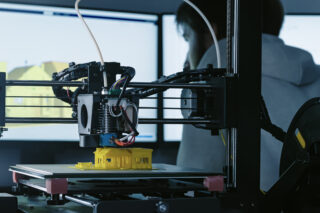 EMBA HSG Impact, News
EMBA HSG Impact, News
 EMBA HSG Impact
EMBA HSG Impact
Do you have any questions or require further information? We will be happy to help.